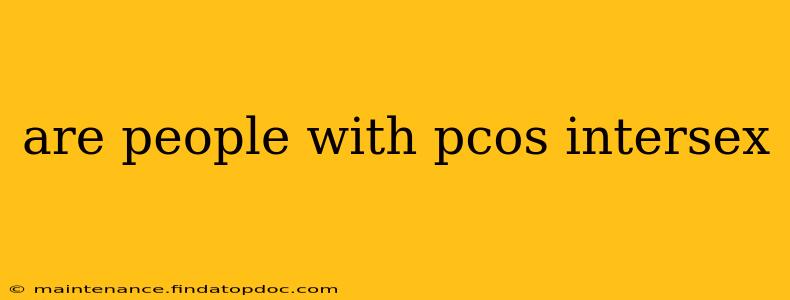Are People with PCOS Intersex? Understanding the Differences
The question of whether people with Polycystic Ovary Syndrome (PCOS) are intersex is a crucial one, requiring a nuanced understanding of both conditions. The short answer is no, PCOS is not considered an intersex condition. However, the relationship between the two is complex and warrants further explanation.
What is PCOS?
PCOS is a hormonal disorder common among women of reproductive age. It's characterized by irregular periods, high levels of androgens (male sex hormones), and the presence of many small cysts on the ovaries. These hormonal imbalances can lead to various symptoms, including acne, excessive hair growth (hirsutism), weight gain, and fertility problems. The exact cause of PCOS is still unknown, but it's believed to be linked to genetic and environmental factors.
What does it mean to be Intersex?
Intersex refers to individuals born with sex characteristics (chromosomes, gonads, hormones, or genitals) that don't fit typical binary definitions of male or female. This is a naturally occurring variation in human biology, and not a disorder or illness. Intersex variations can range widely in presentation, affecting different aspects of sex development. Crucially, being intersex is distinct from having a hormonal disorder like PCOS.
How are PCOS and Intersex Different?
The key difference lies in the underlying causes and manifestations. PCOS is a hormonal disorder affecting individuals assigned female at birth. It involves an imbalance in hormone production within the typical female reproductive system. In contrast, being intersex reflects a variation in sex development, encompassing a range of possible chromosomal, gonadal, hormonal, and anatomical variations. Someone with PCOS will typically have XX chromosomes and ovaries, although their hormonal function is disrupted. An intersex individual might have variations in any of these aspects, leading to a spectrum of different presentations.
Can PCOS and Intersex Co-occur?
While PCOS and intersex are distinct conditions, it's theoretically possible for an individual to have both. This would mean they have the hormonal imbalances of PCOS in addition to a variation in their sex development that falls under the intersex umbrella. However, this is not the norm. PCOS, by itself, does not constitute intersex.
What are the similarities between PCOS and Intersex?
While fundamentally different, there's an area of overlap concerning hormonal imbalances. Both PCOS and some forms of intersex can lead to irregular hormone levels. However, the nature of these imbalances and their underlying causes differ significantly. In PCOS, the imbalance occurs within the context of a typically developed female reproductive system. In intersex variations, the hormonal imbalance is often a consequence of a variation in sex development itself.
Why is it important to understand the distinction?
Understanding the difference between PCOS and intersex is crucial for several reasons:
- Accurate diagnosis and treatment: Confusing the two conditions can lead to inappropriate medical interventions.
- Respectful language and representation: Using accurate terminology is essential for respecting the identities and experiences of individuals with both PCOS and intersex variations.
- Advocacy and support: Both PCOS and intersex communities have specific needs and require different forms of advocacy and support.
In conclusion, while both PCOS and intersex can involve hormonal imbalances, they are fundamentally distinct conditions with different underlying mechanisms and implications. PCOS is a hormonal disorder affecting individuals assigned female at birth, while intersex refers to variations in sex characteristics that don't conform to typical male/female binaries. While co-occurrence is theoretically possible, it's important to understand the crucial distinctions between these conditions.
